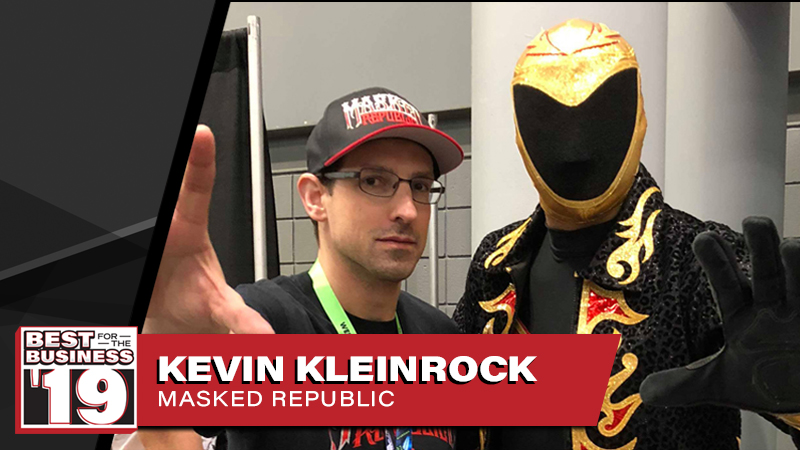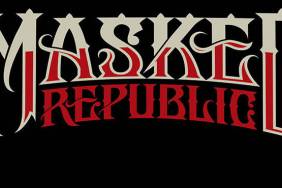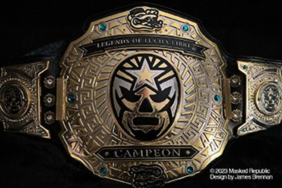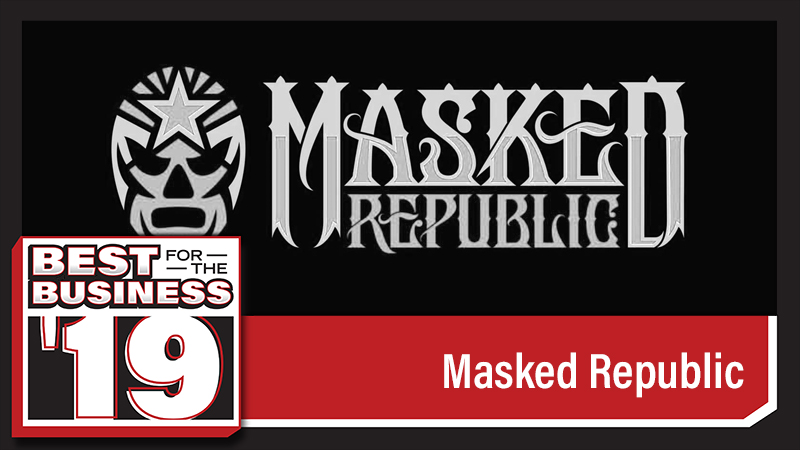
Masked Republic is one of the premier brands in the world of Lucha libre merchandising and they aim to make the Mexican wrestling culture more accessible to fans in the United States.
Co-founder Kevin Kleinrock has been part of the wrestling world for more than 20 years and alongside Ruben Zamora and their team, Masked Republic has brought the Lucha libre culture to the United States and made it more accessible than ever before. The company is headquartered in San Diego, CA but they also have offices in San Francisco, Mexico City, and London and with a hand in creating live events, merchandise and content distribution deals.
Kleinrock has said Masked Republic wants to bridge the gap with their brands, not only entering a market that’s lacking in products, but to help the wrestlers navigate the business world themselves. The company represents a number of Lucha libre’s top names like the Lucha Bros, Rey Mysterio and Tinieblas Jr, helping them create officially licensed products and navigate the business side of professional wrestling branding. In addition, MR has created their own intellectual property brands like The Luchaverse (comic books), Lucha Loot (merchandise crates), Lucha Central (Lucha Libre news) and Saints & Rudos Streetwear.
Not missing a beat, Masked Republic launched a number of new products in 2019 and previewed some more things to come like their new Legends of Lucha Libre action figure line from Boss Fight Studio. Three waves of the highly-detailed figures and accessories are already confirmed, and in what will be their third year this August, Expo Lucha is set to visit Philadelphia for their fan festival highlighting Lucha’s past and present. After two successful events in Las Vegas in 2018 and San Diego in 2019, Expo Lucha makes the journey to the famed 2300 (ECW) Arena, celebrating the 25th anniversary of the arrival of the luchadores in ECW back in 1995.
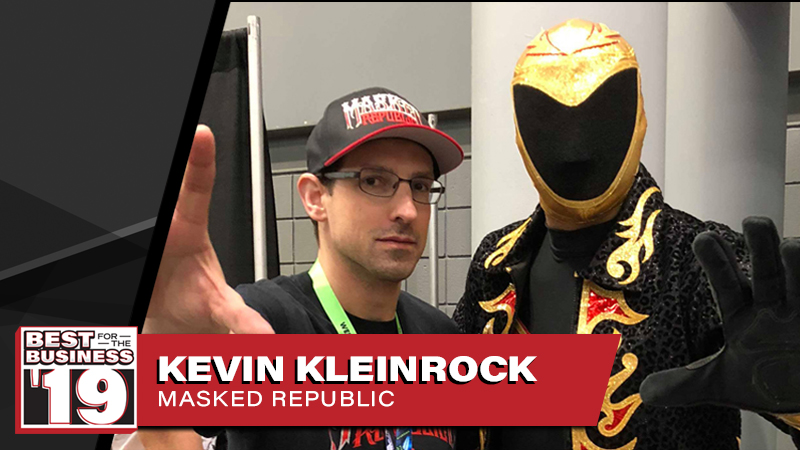
Kleinrock decided he wanted to work in the professional wrestling business when he was 12 years old, and had a job working for Los Angeles based promotion Slammers Wrestling Federation by the time he was 16. Through a series of events and other collaborations, Kleinrock began writing for XPW, the company owned by Rob Black and Lizzie Borden, and later took a job with Big Vision Entertainment, where the family-friendly company ended up releasing more wrestling content, including foreign language Lucha libre content.
“Konnan had been sitting on a large library of stuff that he had purchased, events that he’d promoted or just content that he owned. The very first Rey Mysterio and Juventud Guerrera matches from when they wrestled in bull rings on AAA house shows back in the early ‘90s. So, we put this 3-disc series together called Desperados del Ring and it was all of these classic matches from Konnan’s personal collection, we did them in Spanish and released them in stores, and that in a way—Houston Curtis had been at MTV when they were developing Tom Green and Jackass, and this is how ‘Backyard Wrestling’ started. They were looking for “user-generated” content, people to send in videos and clips they could use on TV. They kept getting a lot of backyard wrestling videos and he said ‘What the hell is this?’ They could never air this on MTV but he decided he would sort of start his own company on the side, and contacted these backyard feds and [offered to put their content on a bigger platform] that’s how they got on VHS and DVD.
Houston pitched a show to MTV to capitalize on the poker craze, and Kleinrock recalled a memorable encounter with the punk band Rancid, who not only watched XPW content but showed up at an event backstage. He said the idea to marry punk rock and wrestling came to him and then put together a compilation of some wrestling footage with music mixed in over it. The ‘Rancid Wrestling Federation’ was pitched to MTV, the network that always supported wrestling but never had a promotion of their own. Comparing it to Bellator and Viacom’s relationship today, MTV saw a cool TV show idea and the pilot for Wrestling Society X was greenlit. While the show ultimately had a short run, it is still fondly remembered for the shocking antics as well as some of the names they helped introduce to a larger American audience for the first time like Jack Evans and Matt Sydal.
Kleinrock and Masked Republic co-founder Ruben Zamora ended up meeting through Konnan after Zamora drove him up to BVE to record the interstitials for his DVD collection in 2004. Zamora owned an apparel company (also called Masked Republic) that did Lucha libre masks for wrestlers like Psicosis and Sean Waltman and kick pad covers for Daniel Bryan. Kleinrock says another setback with a lucha libre pilot under Big Vision led to their new entity, and when mentioning the name carrying over he simply said, ‘the name was cool, we have to keep it.’
“Two things led to us coming together as Masked Republic (in its current form). After Wrestling Society X, we got greenlit for a TV pilot called ‘Viva La Lucha’ for the G4 Network. At the time, G4 Network was like ‘the game channel’ and they were looking to expand.” Kleinrock explained. “They greenlit two wrestling shows that year, us and Kaiju Big Battel and this was the first thing Ruben and I produced together under Big Vision.”
Unfortunately, a network change while they were in the middle of the pilot left them “dead in the water” due to the new brass wanting to move away from combat sports. The other thing that really united them was authentic Lucha libre merchandise—or rather the lack of it being available in the United States.
“The first thing we did was start signing guys up and started making their t-shirts and selling them on LuchaShop.com. For a long time, the merchandise side was just t-shirts and we’d occasionally get into random items—plush keychains, other things—and then we got into Lucha Loot, which is our subscription box/crate. About three years ago, we decided it was about time to move merchandise beyond us sitting here and overseeing some t-shirts being silk-screened. We wanted to create a true brand that we could go to licensing expos and talk with companies about official licensing for their products. That’s when we formed the brand “Legends Of Lucha Libre” because Lucha libre is still very hard for a lot of people outside of wrestling in the business industry to understand.
For whatever reason, there’s this mental block and people can see football, baseball, basketball, even pro wrestling as a sport, but they think Lucha libre is a brand. So we had to come up with a way to trademark and have our own Lucha product that had that name but where we could distinguish what that was. From that, we ended up forming what is the NFL Players Association, but for Luchadors. If you want a merchandising deal as a football player—even beyond that, a box of cereal, a bobblehead—the individual teams can’t necessarily do that without the permission of the NFLPA. That’s what we’ve created for Lucha libre. We have Konnan, Pentagon Jr, [Rey] Fenix, Solar—we have classic legends, the ‘90s stars that are around today like Psicosis and Juventud Guerrera, and today’s hottest talents like Laredo Kid, Taya Valkyrie, Lady Maravilla. We can now go out and work with our various agents and make these product deals to where it’s not only t-shirts, but action figures, Pix Brix, cardboard cutouts and other items we currently have in development.”
In regards to The Lucha Bros, it was noted that while All Elite Wrestling does have certain merchandise rights for the team, Masked Republic and Legends Of Lucha Libre will also retain existing ones that they signed prior to joining AEW. As we saw a few weeks ago, AEW’s action figure line was announced to release later this summer (including the Lucha Bros action figures in wave 2) but Masked Republic’s set with Super 7 are scheduled for release earlier, giving them the bragging rights for the first figure on the market.
More from #ToyFair #ToyFair2020 and images of the first releases coming this summer from @BossFightStudio & @LegendsOfLucha. Lucha Brothers @PENTAELZEROM & @ReyFenixMx Collectors Series figures and accessories. Accessories on scale for use with most modern wrestling figures. pic.twitter.com/mJNb49XlhY
— Masked Republic (@maskedrepublic) February 22, 2020
Penta and Fenix are arguably the faces of Lucha Libre right now, and there are countless new opportunities for talent like them available not only because of Masked Republic’s efforts, but because of how the wrestling business has changed. It was pointed out by Kleinrock that Lucha Underground placed a lot of heavy restrictions on talent with everyone attempting to negotiate, but it is a “night and day” difference working with AEW since they run it like a real business entity.
Legends Of Lucha Libre negotiated the AEW deals for Penta and Fenix specifically, but it was a simple process due to AEW sharing some of the same legal processes and people as the Jacksonville Jaguars, who understand licensing and working with the aforementioned NFLPA.
“The wrestling world is much different than it was even five years ago, and there’s a lot more of people looking out for the wrestlers’ well being. You don’t have as much resistance to talent working with other companies—wrestling or otherwise—as there used to be. WWE contracted talents are largely exclusive to the company, but you can look at some newer talents and NXT stars that still have merchandise on Pro Wrestling Tees and see there are definitely new opportunities that weren’t there before.”
Masked Republic has helped launch a number of other products outside of the traditional wrestling t-shirts and action figures, including the Luchaverse comic book series, cookbooks, kids’ board books, and a thumb wrestling game. Kleinrock says they want to bring viable products beyond just the core wrestling fan and says he measures things on a scale he calls the “Golden Triangle” of Lucha libre fandom. He notes that there’s a hardcore wrestling audience to market to as well as the ‘pop culture’ fans, but the most important one might be a completely underserved Hispanic fanbase and population that doesn’t have enough merchandise geared towards them.
“You don’t have nearly enough products—toys, superheroes, cultural icons—for Hispanics not only in America but globally. It’s about time that people started creating products that appeal to the Hispanic audience. We see these kids and adults at our shows all of the time who are dying for officially licensed products of their heroes and icons, and there just isn’t that product out there.”
In the past year, we’ve seen the Lucha Bros, Rey Mysterio, Andrade and Cain Velasquez as just a few of the names that helped put a bigger spotlight on Lucha libre but there are a number of other wrestlers who are waiting to be discovered. It’s worth noting that this interview took place before the coronavirus and travel restrictions impacted the world of wrestling, but Kleinrock saw El Hijo del Vikingo in AAA as someone to look out for in 2020 to help bridge the gap between Mexico and the United States.
The minute that kid gets a visa he is going to on every major indie show, every major tournament. People are going to want to use him, he’s just that new ‘next level’ guy. He won Copa Antonio Peña in 2019, he’s insane.
Citing other examples of talent that are more well known domestically, Kleinrock praised names like Brody King, Eli Everfly, Jake Atlas as people getting bigger opportunities because they know how to work a lucha style and not just throw in a couple of moves. Kleinrock told a story about King’s match at the first Expo Lucha event in 2018, noting that they were calling spots in the ring and Psicosis was surprised he could work the style so well.
“Because you’ve got these hybrid wrestlers now, and we don’t use that term ‘hybrid’ too much anymore because it’s been incorporated into American wrestling—but there’s a big difference between doing a few Lucha moves and actually training to do the Lucha style, the sequences. So I think the fact that you can see guys like Brody King, Jake Atlas [who recently signed with WWE], do these Lucha sequences, do more than just a move here and there, it really helps broaden—we’re never going to have another time like the ‘90s where Rey, Psicosis and Juvi came to ECW. No one had ever seen that before, and for the most part I think we’re beyond any kind of wrestling, with not having seen it before, [having that influence] because of the internet age where you can see everything from around the globe. But, I still you’re finding more lucha libre beyond a move here or there creeping into American pro wrestling and it’s really cool and interesting to see the influence continue to grow.”
Kleinrock says he wants the legacy of Masked Republic to be that of a multi-platform entertainment company and a licensing company that can fairly represent the wrestlers, entertainment properties and brands. He says there are so many good indie shows and events going on that they’re focused on bringing entertainment in new ways and to new markets that might not otherwise have that chance.
“We started our Expo Lucha convention to be the ‘Lucha Libre Comic Con’ and we’re working on expanding that brand to be completely separate as a way to bring legends, icons and the hottest stars of today to fanbases and towns that don’t normally get to see these stars. I had an adult man come up to me at Expo Lucha this past year in San Diego with tears in his eyes, [telling me] ‘I grew up idolizing Octagon and I never in a million years thought I would have a chance to meet my idol of my youth. Thank you so much for bringing him here.’
“Those moments are why we have to keep doing Expo Lucha. It’s great for the luchadors too, to be go to cities and be embraced by fanbases that wouldn’t normally have a chance to see them. Las Vegas and San Diego—where we’ve had Expo Lucha the first two years, they’ve had lucha shows before—but never a two-day event of multiple shows, dozens and dozens of wrestlers. In August we’re bringing it to the former ECW Arena in Philadelphia to celebrate the 25th anniversary of [the US invasion of lucha libre] in ECW and the lasting impact it has had.”
“We are truly a company that’s going to touch live events, TV, film, merchandising and beyond, and be a way for us to build something special, but also a way to give these luchadors opportunities beyond what they’ve ever had before, to be treated as real athletes and real icons of culture.”
